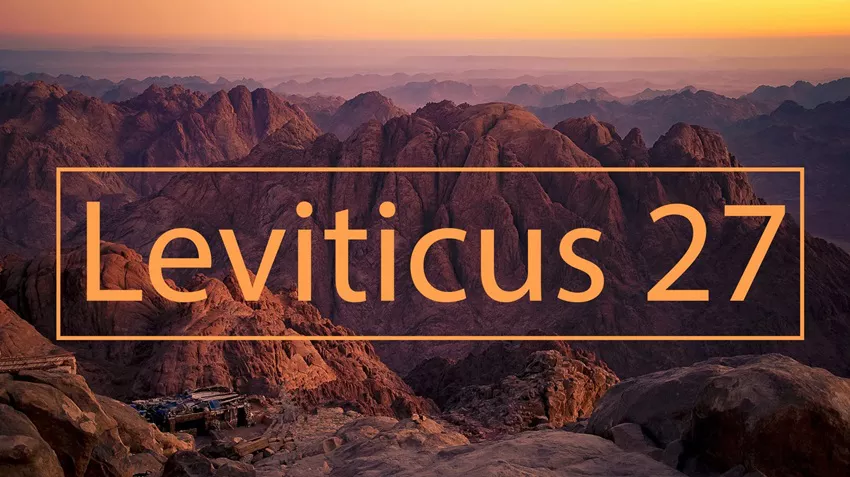Leviticus Chapter 27 Summary
Leviticus 27 outlines the regulations for making vows to the Lord, including the consecration of individuals, animals, and property. It provides guidelines on how to value people or things dedicated to God and how to redeem them if necessary. The chapter distinguishes between different types of vows, such as dedicating a person to the Lord, offering animals for sacrifice, or dedicating land. It also addresses the redemption of property, including the payment required to redeem it. Additionally, it stresses that once something is consecrated to God, it should not be altered or exchanged. Leviticus 27 emphasizes the sanctity of vows and the importance of fulfilling promises made to God.
Bible Leviticus Chapter 27
Welcome to read Leviticus Chapter 27. Here is the list of Exodus Chapter 27:
What Does Leviticus Chapter 27 Teach Us?
Leviticus 27 concludes the book of Leviticus with instructions regarding vows, dedications, and offerings. This chapter emphasizes the importance of holiness, the principle of consecration, and the seriousness of vows made to God. It also addresses how to redeem or fulfill vows involving people, animals, and property. Below are the key teachings from Leviticus 27:
1. Vows and Dedications to God
Leviticus 27 opens with instructions for making vows of consecration. When a person dedicates something or someone to the Lord, it is considered a solemn promise or vow. The person who makes the vow is to determine its value, based on the value set by the priest. This principle teaches us that dedicating ourselves or our possessions to God is a serious matter. It highlights the need for intentionality, thoughtfulness, and honesty in our relationship with God. For Christians, this speaks to the call to live lives dedicated to God, valuing His presence and promises above all else (Leviticus 27:1-8).
2. The Redemption of Vows
One of the primary themes of Leviticus 27 is the redemption of vows. If someone made a vow to dedicate a person, animal, or property to God but later wished to redeem or recover it, they could do so by paying a specific value. This redemption system reflects God’s mercy, allowing for the restoration of what had been consecrated, but at a price. It demonstrates the importance of fulfilling one’s commitments, but also acknowledges the possibility of returning or reassigning what was dedicated, which helps to preserve relationships and God’s justice. For Christians, this principle may remind us of the grace of God, who redeems us from our vows and promises through Jesus Christ’s sacrifice (Leviticus 27:9-25).
3. Consecration of Animals
The chapter further addresses the dedication of animals to God. If an individual dedicates an animal to the Lord, it becomes holy, and it cannot be exchanged or redeemed. If an animal is unacceptable for sacrifice, it must still be valued and may be redeemed by payment to the priest. This teaches us that what is set apart for God must be given with sincerity and without substitution. It reflects the biblical principle of offering our best to God. For Christians, this reminds us of the call to offer our best in service to God, just as Jesus gave Himself as the perfect sacrifice for us (Leviticus 27:26-27).
4. The Redemption of Land
Leviticus 27 also discusses the redemption of land. If a person dedicates land to God, it can be redeemed by paying its value, with the price being determined by the number of years remaining until the Year of Jubilee. This reflects the ongoing cycle of redemption in God’s economy and emphasizes that property and possessions ultimately belong to God. The principle teaches that all earthly things are temporal and should be held loosely, as they belong to God. For Christians, this points to the importance of being good stewards of what God has entrusted to us, remembering that all things are ultimately His (Leviticus 27:16-24).
5. The Tithe and the Firstfruits
The final verses of Leviticus 27 affirm the importance of the tithe, the practice of giving one-tenth of one’s possessions to God. Tithing is seen as an acknowledgment of God’s ownership over all things. The tithe is set apart as holy, and it must be given to the Lord. This practice is not just a financial obligation, but a way of acknowledging that all things come from God and belong to Him. For Christians, the principle of tithing extends beyond money—it involves giving our time, talents, and resources to further God’s Kingdom. It is a tangible way to express our gratitude for His provision (Leviticus 27:30-33).
6. God’s Faithfulness in Our Vows
Leviticus 27 emphasizes that vows made to God are sacred and should be fulfilled. However, it also recognizes that God is merciful and provides a means for redemption when one cannot fully meet the vow. This teaching reminds us that while we are called to be faithful to God in our commitments, we can also trust in His grace when we fall short. It encourages believers to approach their vows and promises to God with seriousness but also with the understanding that God’s redemption is available through Christ.
Related topics:


